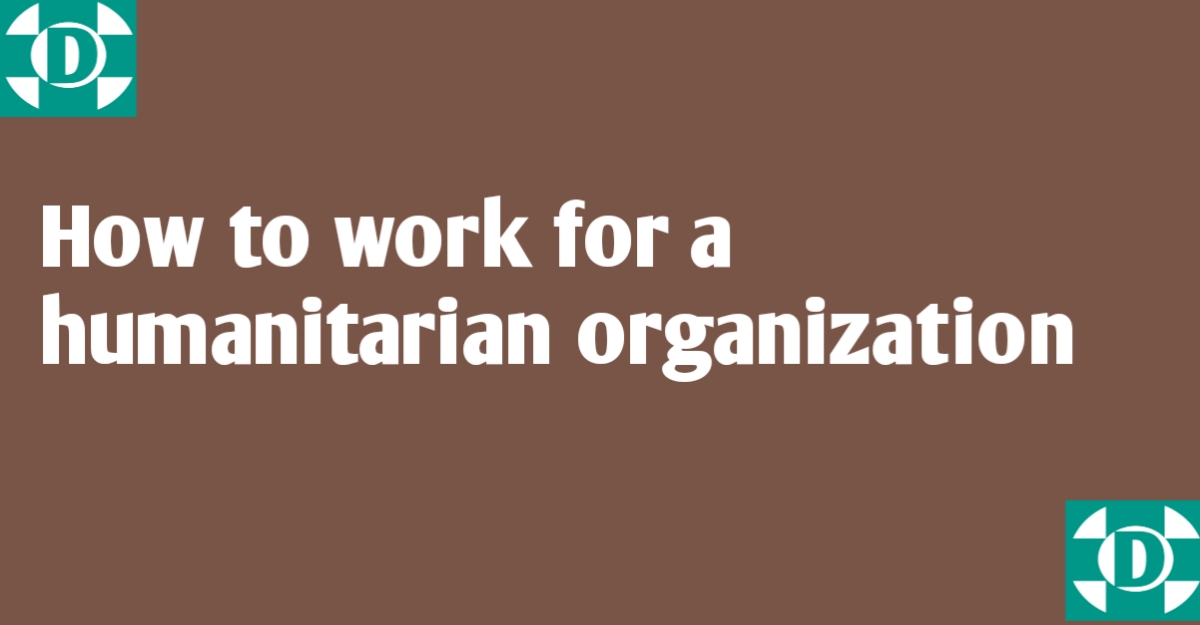How to work for a humanitarian organization

How to work with humanitarian aid
Saving people’s lives and alleviating their suffering using your professional skills and passion in a humanitarian setting. It can be a deeply rewarding way to make a difference in the world. Here are some steps to guide you in working for a humanitarian organization.
Think about your area of interest:
The first thing to do is to think about the area in which you want to work for a humanitarian organization. Through researching various humanitarian causes, you can identify the issues that align most with you; examples include working in refugee support, disaster relief, healthcare access, or environmental protection.
Considering your skillset helps you reflect on your strengths, qualifications, and experiences that could be valuable to this field. Whether it’s logistics, communication, medical, administrative, engineering, or social work,.
Gain relevant experience:
There are various ways to get experience working with humanitarian organizations, such as volunteering locally, where individuals will look for volunteering opportunities at local humanitarian organizations, homeless shelters, or community development programs. This allows you to acquire practical experience, build your experience, and improve your confidence in serving others.
However, you can seek international volunteer opportunities with organizations like the Peace Corps: peace corps or UN Volunteers: offer international placements where you can contribute your skills while gaining valuable cross-cultural experience.
Read also: MSF blood transfusion guidelines for nurses and doctors
Enhance your qualifications:
Pursue relevant education, consider a degree or certificate in fields like international relations, public health, social work, medicines, nursing science or development studies. Look for programs that focus on humanitarian action or specific causes you’re interested in.
Another skill needed is to develop your language skills. It is important to learn a new language, especially one spoken in areas where humanitarian assistance is needed, because it can significantly enhance your employability and ability to connect with communities. For example, in the northern part of Nigeria, most of the Hausa people are affected by malnutrition. Many humanitarian organizations, including doctors without borders, work to assist children. Most of the humanitarian organizations in these regions prepare candidates who can speak Hausa; learning Hausa is very important, as mentioned above.
Read also: 6 best NGO jobs for Nurses in Nigeria
Research and join the humanitarian organizations:
There are different types of humanitarian organizations; all you need to do is identify the target organization for which you want to work. Such humanitarian organizations as the Red Cross, Doctors Without Borders, or specific NGOs align with your interests. Visits their websites, social media pages and channels for job postings and internship opportunities.
Cover letters and resumes are very important in finding jobs. Get your resume and cover letter ready and always highlight your skills, experience, and passion for the specific organization’s mission in your application documents.
Obtain advice and connect with professionals in the field
By attending industry events and conferences, you can connect with some individuals working in humanitarian organizations. This can be essential for you, as it allows you to learn about their experiences, gain insights into the field, and discover job openings.
Utilizing online platforms to join professional groups on social media platforms like LinkedIn. Engage in discussions, connect with individuals working in the field, and learn about other potential opportunities.
Conclusion
It is important to know that working in humanitarian organizations is very rewarding; it gives you the opportunity to help and alleviate people’s suffering. Furthermore, you can ask questions and seek clarification. Thanks for reading “How to work with humanitarian aid” on Dahbaao


